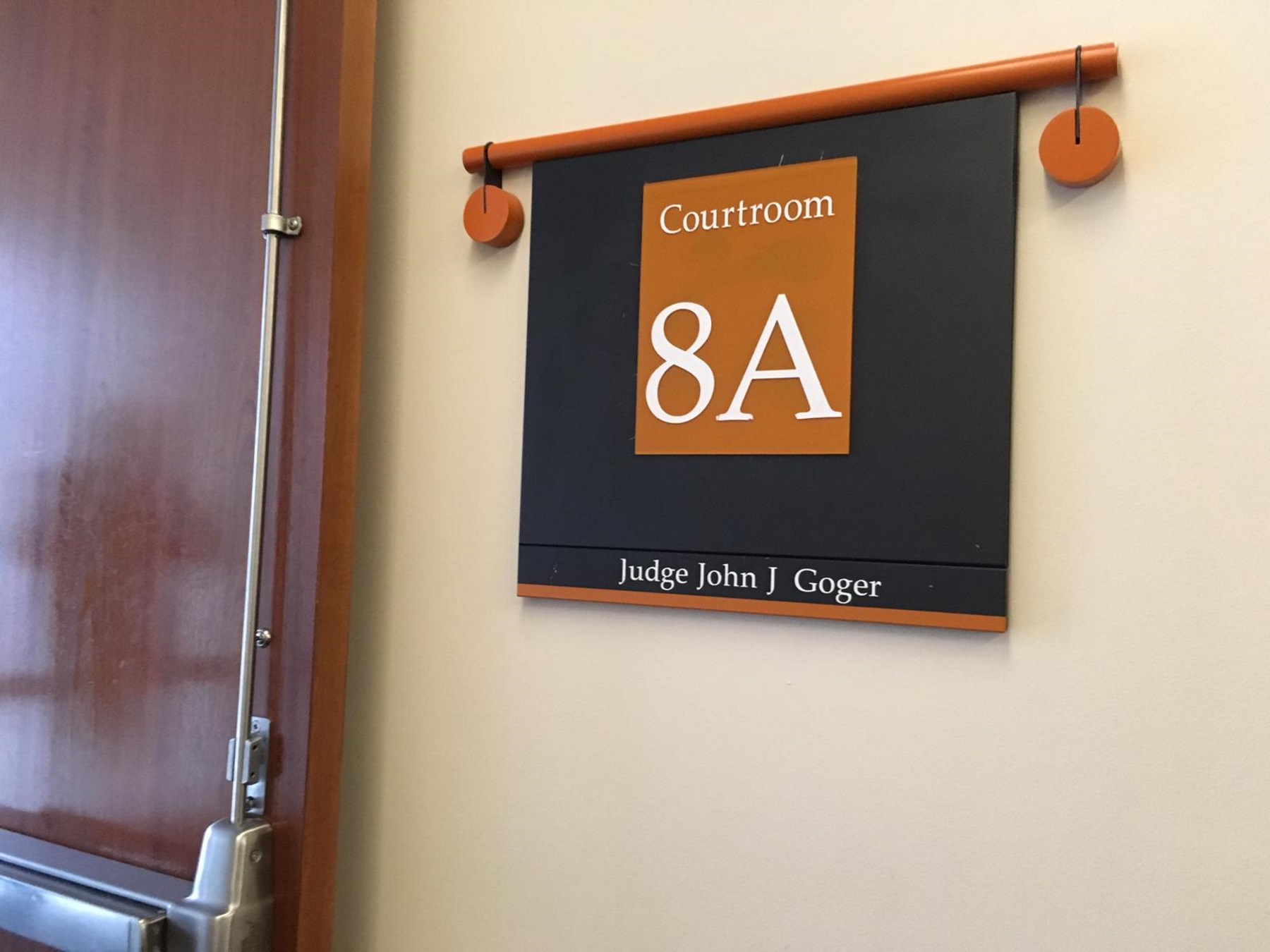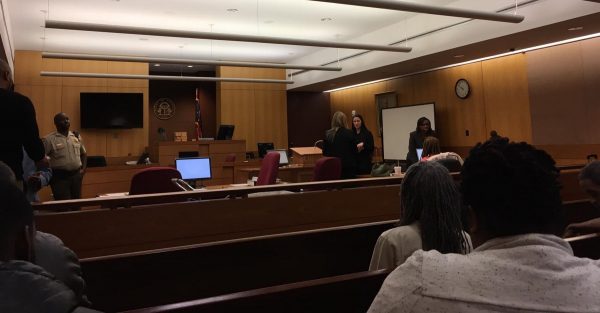Amendment 2: Does Georgia ‘Need’ A Business Court?

Judge John Goger is the presiding judge of the Metro Atlanta Business Court Division at the Fulton County Superior Court in downtown Atlanta. Lawmakers are asking voters if they want to expand business courts statewide through Amendment 2 on the ballot.
Tasnim Shamma / WABE
There are about two dozen states with business courts. It’s a special type of court where judges only rule on business disputes, often involving large sums of money.
Georgia has a business court based in Fulton County, and lawmakers are asking voters if they want to expand it statewide through Amendment 2.
Fulton’s Business Court
Judge John Goger is deputy chief judge of the Superior Court of Fulton County and presiding judge of the Metro Atlanta Business Court Division.
The court officially launched in Fulton County in 2005, under the leadership of retiring Judge Melvin Westmoreland. That’s after Atlanta businesses lobbied for faster service.
“A judge who has 200 criminal cases and 150 civil cases has a hard time devoting that much effort to one single case,” Goger said.

Business cases are very niche. They involve the sale of stocks and bonds, complicated mergers and trade secrets. Litigation and long discovery processes can take too long for a regular judge to spend time fully understanding, attorney Bob Brazier says.
“Time is money,” Brazier said. “You can wait six, eight, nine months. I’ve waited a year for rulings on simple motions.”
Brazier said criminal defendants should have their constitutional right to a speedy trial. But that also means his clients rack up millions in legal fees just waiting. So his clients gladly pay $2,500 to transfer qualified cases from civil to business court.
The business court has four judges handling about 50 cases in Fulton County. In 2016, Gwinnett County joined the court and added two judges to the roster.
Amendment 2
State lawmakers are asking voters if they want to create a statewide business court through an amendment to the state constitution.
“It’s like any of the other constitutional amendments. Frankly, it’s always got legalese in it, and it’s not written necessarily in plain English for everybody to understand,” said Georgia State University law professor Jessica Gabel Cino.
She voted yes on the amendment.
“You’re going to have judges who are dedicated to being business court judges,” Cino said. “There is less of an educational leap that has to happen.”
And at the end of the day, she says it helps the state attract more businesses by appearing more business-friendly.
But Democratic state Sen. Jen Jordan told WABE’s “Closer Look” host Rose Scott the amendment language is too vague.
“It’s almost a whole other type of court system in the state,” Jordan said. “That sounds great. I don’t think anybody could disagree with how it’s worded. I think the problem is the meat on the bone.”
No Elections
Jordan said one of her issues with the amendment is that business court judges will not have to run for election.
The amendment says judges would serve five-year terms, appointed by the governor and approved by state lawmakers.
Attorney Brazier said he likes the business court in Fulton County but will vote no on the amendment.

“I am not in favor of the amendment,” Brazier said. “Simply because of the way that judges are going to be chosen by the state Legislature. That lends itself to cronyism, and I would rather have the judges elected.”
Judge Goger does stand for elections and leads the business court in Fulton County, but he said judges being appointed is not a big deal.
“Typically, when it comes to judges, the reason they are favored is because they’re pretty qualified at what they do,” Goger said. “That’s why they’re favored. Whoever gets the job is going to be a judge that will consider some dispute typically between two businesses. It’s not as if the business court judge presides over a situation where there’s this big corporation on one side and a poor soul on the other. There’s no Goliath, and there’s no David. There’s just two Goliaths or two Davids on both sides.”
No Real Urgency
But one big question is whether there’s any need for a statewide business court – it’s why there was a pilot that expanded to Gwinnett County.
Goger was part of the Georgia State Bar committee that asked all of the judicial districts in the state if they were interested in a business court. Only one or two counties expressed interest.
“They didn’t have any cases to suggest that they needed a business court in their jurisdiction. So that tells me that outside of metropolitan Atlanta, I don’t know that there’s any real urgency for it.”
And even then, only Fulton County is handling the cases with large sums … millions of dollars.
Since Gwinnett joined the court in 2016, only two cases were transferred to business court.
Attorney General Debate
During a recent debate between Attorney General Chris Carr and Democratic challenger Charlie Bailey, Bailey said he would vote against the ballot amendment.
“I have full confidence in the state courts and the superior courts in the state of Georgia to address [complex litigation] issues, so while I do think it has some merit, I will not be voting yes on that,” Bailey said.
Carr was chair of the Court Reform Council that proposed the ballot amendment.
“Those that have been involved in the business court in Fulton and Gwinnett counties thought that it was a very positive thing for us to do, so I will be voting yes,” Carr said.
Goger said he’s in favor, too, and hints he would be open to leading it.
Court Expenses
But Goger said the judges might be getting paid too much. Goger said the state administrative offices have budgeted nearly a million dollars for the statewide business court.
“You know, we pay our senior judges a total of $19,000 a year to help us [run the business court division],” Goger said. “And then there’s me. But, you know, I don’t charge this court any money. Doing the judge thing is something that you gotta love to do, independent of what you’re doing.”
The metro Atlanta business court division in Fulton County costs about $230,000 to run.
If voters approve the amendment, Goger said he feels confident state lawmakers will figure out the final details.
For full election coverage visit election.wabe.org.








